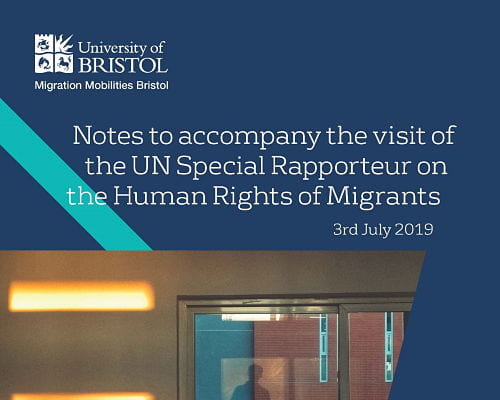
By Diego Acosta, Bridget Anderson and Lindsey Pike
On 3 July 2019, the UN Special Rapporteur on the Human Rights of Migrants, Professor Felipe González, visited the University of Bristol. The event was organized by Migration Mobilities Bristol (MMB) with funding from PolicyBristol. Here we outline the scope of his work and focus of his visit.
During the event, the Rapporteur presented the work of his office and his latest activities. He then heard from the City Council, civil society, NGOs, business representatives and academics about the challenges migrants and refugees face in the UK. This included discussions about the situation of EU citizens after a possible Brexit, the Windrush scandal and the effects of the so-called hostile environment policy.
MMB provided a dossier of notes to accompany his visit. This outlined the breadth of interests of MMB researchers, and salient issues about the rights of migrants in Bristol. As this was not an official visit, the Rapporteur will not be producing a final report with his observations. However, he took good notice of all the issues raised, and we are pleased to have been able to facilitate connections between the Rapporteur, the University and the city of Bristol.
The Special Rapporteur’s role
The Special Rapporteur’s role was created in 1999 by the Commission of Human Rights. Professor González, a Chilean, is the fourth person, and third Latin American, to hold the mandate, which covers all countries regardless of whether a state has ratified the 1990 United Nations Migrant Workers Convention (the UK has not). He can request and receive information from various sources, including migrants themselves, about individual cases of alleged violations of human rights, or about general situations of concern in a particular country. The Rapporteur is not the ‘last resort’, meaning that complainants can approach him at any time; they do not have to exhaust domestic remedies first.
The Rapporteur has three main tools to carry out his work:
- Country visits (also called fact-finding missions) allow the Rapporteur, following an invitation by the relevant government, to examine first-hand the situation of human rights protection in a particular state. Following such a visit, a report is submitted to the Human Rights Council with his findings, conclusions and recommendations.
- ‘Communications’ allow the Rapporteur to bring to the attention of a particular government alleged violations of the human rights of migrants, without the need to visit that particular country. This was, for example, the case with his
- The Rapporteur produces an annual report to the Human Rights Council about the global state of protection of migrants’ human rights but can also produce thematic reports on issues of interest, such as the one on bilateral and multilateral trade agreements and their impact on the human rights of migrants. The Special Rapporteur also reports to the General Assembly.
We were honoured to host Professor González and hope to continue our exchanges in the coming years.
Further information
Further information about the mandate of the Special Rapporteur is available here. Please email mmb-sri@bristol.ac.uk if you’d like to be involved in MMB’s ongoing communication with the Special Rapporteur.
